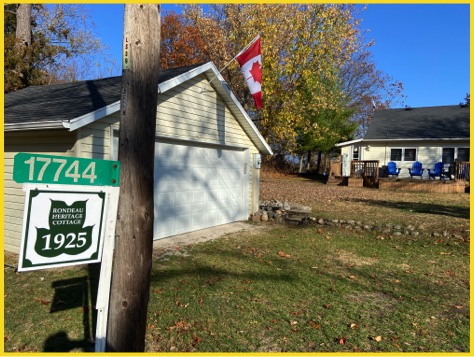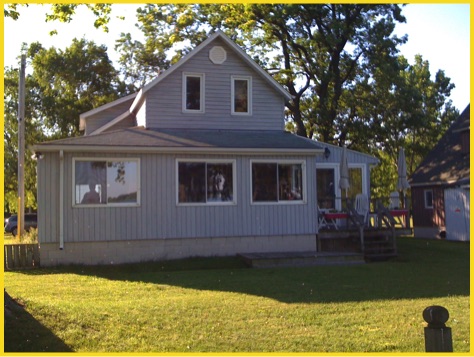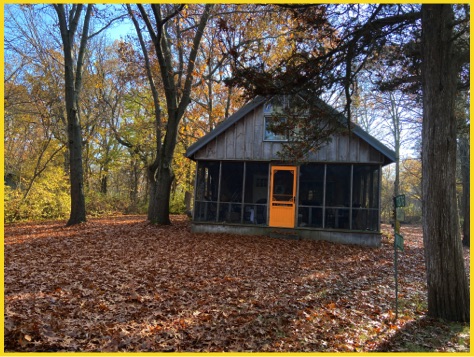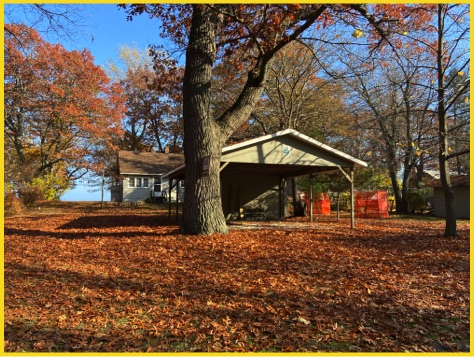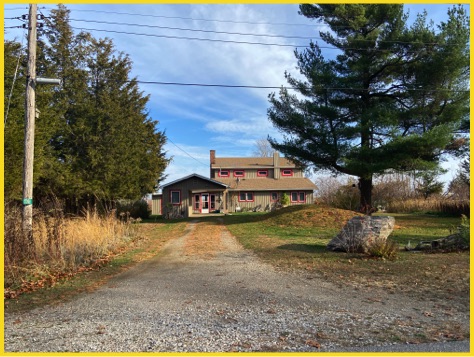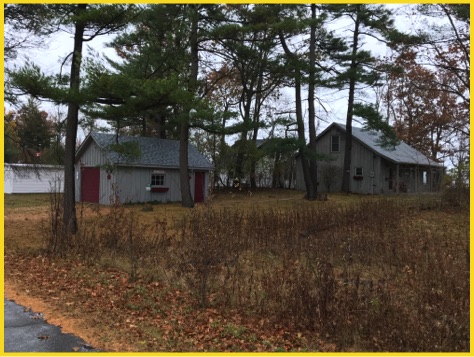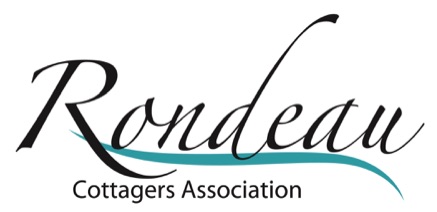
The Facts About Our Cottages...
Myth: Cottages don't belong in Rondeau.
Fact: Rondeau became a provincial park to host its cottage community, and cottages have been here since the beginning. Rondeau Provincial Park was chartered in 1894 specifically for the purpose of cottaging. It is the only provincial park in Ontario founded for this reason. The earliest cottages still standing today were built ca. 1903; older ones have been demolished by the province. The cottage community has long proven itself integrated and compatible with the park's thriving ecology.
Myth: Cottages are temporary structures that can be easily relocated outside of the park.
Fact: Rondeau's cottages had to be constructed to standards of the day when they were built. While almost all cottages are wood frame structures, they were designed to be permanent and cannot be easily removed. Most cottages have foundations and some even have basements. They're definitely not temporary.
Myth: We always knew we'd have to demolish and leave.
Fact: Rondeau's original cottage leases were the standard 21-years, always renewable in perpetuity. This changed in the 1950's as the park wanted to expand the campground and planned to develop hundreds of transient trailer sites where the cottages sat. The 278 cottages have original Crown Leases from 1933 that were extended in 1954, 1975, 1996, 2017, 2019, and most recently 2022-24. As per O.Reg. 347/07 cottages are already authorized in Rondeau thru 2038. Yet we're still officially viewed as "temporarily" occupying public parkland. C'mon.
Myth: No other provincial parks have cottages.
Fact: Rondeau is one of a dozen parks with privately-owned cottages within park boundaries: Algonquin, Awenda, Balsam Lake, Bon Echo, Bonnechere, Kawartha Highlands, Killarney, Presqu’ile, Sandbanks, Sleeping Giant and Sturgeon Bay. In addition, Ontario Parks has been steadily constructing their own rental cottages ("roofed accommodation") in many other parks. There are 5,000 cottages in 17 provincial parks in Manitoba, 2,000 cottages in provincial parks in Saskatchewan and 500 cottages in provincial parks in Alberta. All warmly welcomed.
Myth: Only Rondeau is home to hundreds of cottages.
Fact: Rondeau's cottages form a village; every cottage is close to its neighbour. Algonquin has a similar number of cottages but they're widely scattered around lakes and one might be several kilometres from its nearest neighbour. Kawartha Highlands Signature Site Provincial Park near Peterborough hosts more than 500 cottages on privately-owned lots. Kawartha Highlands is regarded as a groundbreaking partnership between Ontario Parks and private landowners. This is a proven-successful model for the future of cottaging in Ontario.
Myth: Rondeau's cottages were built haphazardly along the beach without park approval or authorization.
Fact: Rondeau's cottages were built exactly where the government told us to build. Although surveying in the early 1900's wasn't quite as scientific as it is now, each cottage lot was staked-out by park staff prior to construction. Almost all "off-lot" structures were demolished in the last few decades... any that remain are grandfathered and owners pay an additional land-use permit fee defined by our landlord. The original plan for the park saw groups of six cottages separated by a public beach access. While the province has demolished 100+ cottages in the last 60 years, the remaining cottages still firmly adhere to that plan. Sadly the park stopped maintaining the public beach accesses in the 1980's so they are impassable and no longer usable as such.
Myth: Rondeau's cottages aren't "Heritage" at all. They're an aberration in a park and should all be demolished.
Fact: Rondeau is Ontario's original cottage community and has been recognized as a Cultural Heritage Landscape of provincial and local significance. We meet the provincial definition under O.Reg. 10/06 and the municipal definition under O.Reg. 9/06 as determined by experts in this field. A 2012 study on the cultural heritage aspects of Rondeau's cottage community won a national award from the Canadian Association of Heritage Professionals. Incidentally, one of the three primary goals of Ontario Parks is heritage preservation -- so we encourage them to follow their own rules and recognize Rondeau as a community deserving of permanent protection.
Myth: Cottage visitors don't meaningfully affect park entry counts. Most people through the gates are birders.
Fact: We very strongly disagree. Although we don't have visitor destination stats, the RCA believes at least half of all gate entries (80,000 out of 160,000) will end up at a cottage. As a Visitor Centre employee noted, "Get rid of the cottages and you'll have to get rid of us... nobody will come down here anymore."
The Facts About Our Leases...
Myth: Lease fees are a bargain and don't cover the costs of having cottages in the park.
Fact: Our leases are only one of four fees cottage owners pay to the province every year. In additional to our annual Lease fee we also pay an annual Service Fee, an annual Payment In-Lieu of Taxes, plus we also have to purchase the same park entry passes that everyone else has to buy. All visitors to our cottagers must pay the gate fees as well. These costs are all set by government; we just write the cheques -- year after year.
Myth: Everyone pays the same Lease Fees.
Fact: Our Lease fee payment -- one of the four annual fees we must pay -- is dependent on the size of our lot and where it is located within the park. There are four lease fee categories: Bayside, Lakeside (50'), Lakeside (75'), and Interior. As you would expect the most expensive lots are near the water. Only a half-dozen lots on Rondeau Bay are "waterfront"... none of the lots along Lake Erie actually get anywhere close to the water.
Myth: The Service Fees don't fully cover costs.
Fact: Our annual Service Fee -- billed on top of our Lease fee -- was calculated to recoup the costs of garbage disposal and other direct cottage-related issues. It was never supposed to be profit- making. It was reported to be fair and reasonable by the park superintendent when it was last reviewed. Our Service Fees are the second of four annual fee we pay to the province.
Myth: Rondeau cottagers don't pay property taxes.
Fact: Wrong! We do indeed pay annual Property Taxes to the Municipality of Chatham-Kent under the terms of the Municipal Tax Assistance Act. The only difference between us and normal "freehold" property taxes is that we pay our taxes to the province who then forwards them on to the municipality. Our cottages are assessed by MPAC just like everywhere else in Ontario, and of course valuations are based on the size and construction quality of each cottage. Our mill rate is the standard Harwich Township Residential rate. These Payments In-Lieu of Taxes are the third of our four annual payments to the province.
Myth: Cottage owners get free entry to the park.
Fact: We have to purchase park entry permits just like everyone else. All our guests do too. Cottage families must purchase one Summer / Annual Pass per vehicle; with extended family and guests this may easily amount to 10 passes per cottage. At current rates it costs most cottage families an additional $500 to $1,000+ every year just to visit our own cottages. This is the fourth and final fee we pay to the province every year.
Myth: Our leases have expired numerous times already but we've squatted on the land and refused to leave.
Fact: Rondeau's original Crown Leases were issued as 21-year leases renewable forever. The perpetually- renewable clause was removed in the 1950's. So far our 1933 leases have been extended six times -- in 1954, 1975, 1996, 2017, 2019, and now 2022-24. The original leases all expired at staggered times but in 1996 the province changed them all to a common expiry date of December 31 to simplify their own record keeping. No existing cottage leases have ever expired, although some have been cancelled over the years for non-payment or late payment due to financial hardship of their owners. Dozens of other cottages have been purchased by the province and demolished without need simply to reduce the number of cottages in the park.
Myth: Cottage owners do not respect the terms of the lease.
Fact: The park staff monitors everything that happens in the park, whether by day-users, campers, or cottagers. Although new leaseholders may occasionally be educated about park regulations, we are not aware of charges being laid against cottagers in recent years. Violations of lease terms are almost always due to a lack of understanding of the regulations, often because the park rules have changed without warning. The RCA has always offered our assistance to park staff in communicating rule changes or general concerns out to our membership. We are all partners in the park and following the rules helps ensure Rondeau continues to thrive.
The Facts About Rondeau's Ecology...
Myth: Our septic systems are poisoning the groundwater.
Fact: This myth is absolutely unfounded. Two percolation studies done by respected & qualified independent engineering firms both confirmed the groundwater in the cottage community is free of fecal coliforms and perfectly safe to drink. Note that the sample wells were located in the most densely-populated part of the park and the samples were drawn at the height of the summer cottaging season. Yet so-called environmentalists continue to ignore the evidence and perpetuate this awful lie.
Myth: The park office gives us free bottles of water because our wells are poisoned with sewage.
Fact: We have no idea where this bizarre claim came from but it's completely untrue. As you read above, any allegation that our groundwater is unsafe is unfounded. While some cottage families may prefer the taste and convenience of bottled water, many others drink directly from their taps (sandpoint wells) and have for years. For the record, the park has never provided free bottles of water for use by cottagers or anyone else.
Myth: Cottagers have introduced non-native plant species such as Japanese Barberry and White Poplar into the park.
Fact: This is a qualified "yes". Qualified, because the concept of non-native species is a fairly new idea compared to the 125+ year history of cottages in Rondeau. There was a time when any and all plants and flowers were permitted to be planted on cottage lots; back then, nobody knew any different. And "senior" cottagers have reported that some now-prohibited plant species were welcomed into the park by the Superintendents of the day because they were considered hearty and attractive. Now, of course, we are all better-educated in the concept of non-native species and this simply doesn't occur anymore.
Myth: The presence of cottagers harms species-at-risk.
Fact: Ontario Parks calls Rondeau the "Crown Jewel of biological diversity" in its 340-park system. Rondeau is home to numerous species-at-risk, and many of them live around our cottages. Five-Lined Skinks and Fowler's Toads most notably. This very fact disproves the myth; if our presence caused harm we would never see them. Especially after 125 years of cottaging. Ontario Parks biologists have credited the health and success of species-at-risk populations in Rondeau to the inevitable side-effects of human presence, such as the shelter afforded by woodpiles, decks, and boardwalks. In fact the Five-Lined Skink was once thought to be extirpated at Rondeau until biologists started looking around cottages and found lots.
Myth: Cottages dominate the park and squeeze-out nature.
Fact: Using the MNRF's own lot size data, all 278 cottage lots collectively occupy 46.6 acres which is only 0.58% of the park. To confirm, this is barely one-half of one percent of the park's 8,041 acres. By comparison, the main campground is much larger at 64 acres. The average cottage lot size is 0.17 acres; many are much smaller. Our lots are tiny; most are rectangular and almost all are hundreds of feet from the water's edge. In aerial photos of Rondeau it's tough to even spot the cottages.
Myth: Cottages have blocked the entire Lake Erie shoreline.
Fact: While approximately 75% of all cottages are on Lakeshore Rd, they are widely separated and many that once stood have since been demolished. Overall, cottage lots front 2.3 miles of the 6.2 mile Lake Erie shoreline within the park. Keeping in mind the cottages themselves are located hundreds of feet back from the lake, and the entire beach and dune system is public land and fully accessible to anyone at all times, it is accurate to say that two-thirds of the Lake Erie shoreline is not fronted by cottages. And Rondeau's cottagers have never once claimed any special right of access to the beach beyond what is granted to everyone else. It's not "our beach" and it never will be.
Myth: Cottagers damage the dunes and beach grasses with off-lot encroachment.
Fact: Off-lot encroachment has been a focus of education and enforcement in recent years. Decades ago off-lot encroachment was common and it was often done with the full knowledge and permission of the Superintendent of the day. However now it is well-known where our leased lot ends and cottagers claim no special right of access beyond it.
Myth: Cottagers don't support environmental initiatives.
Fact: Over the years the cottage community has sponsored, supported, or participated in numerous environmental initiatives. We were the largest corporate donor to the Marsh Viewing Tower fundraising project and our individual members participate in bird counts, deer counts, and beach clean-ups. However we are most proud of our 1996 sponsorship of a scientific study entitled "An Assessment of Forest Ecosystem Health"...
From the introduction to the final report: "This project was Initiated and sponsored by the Rondeau Leaseholders Association, the organization representing the interests of the private leaseholders at Rondeau Provincial Park. Since the park's establishment in 1894, the leaseholders have been long-term users whose experience here is often longer than that of Park staff. The leaseholder community is made up of a cross-section of society who have diverse backgrounds, generally not related to park management or natural resources. However, their lay-perspective and long-term experience place them in a unique position to observe changes in the park over time. In recent years leaseholders have observed a "decline in the health" of trees and forests in the park and began to question the causes. The symptoms of this perceived health problem were continual blowdown of canopy trees (wind-throws), the death of canopy trees, a profusion of grape vines, and an increase in shrub thickets in areas previously occupied by canopy trees. Because the leaseholders did not entirely understand ecological processes and the management strategy, and perhaps they were unsatisfied with explanations given by OMNR staff, the Association decided to obtain an independent assessment of the forest ecosystem health of the park."
The ambitious and wide-ranging RCA-sponsored study directly resulted in the park adopting innovative forest management policies that are still being practised thirty years later. We are proud to have played a part in this groundbreaking stewardship research that has improved Rondeau's forest ecosystem health to the benefit of all park visitors.
The Facts About Cottage Owners...
Myth: We're all wealthy.
Fact: We wish! Like in any normal community, Rondeau's cottagers have a wide variety of occupations and income levels. The vast majority of our members go to work at regular jobs every day or are retirees. For many years the cheapest buy-in in Southern Ontario was here in Rondeau; in the 2000's it was common to find cottages for sale for less than $50,000. While asking prices have fluctuated along with the real estate market, Rondeau's cottage selling prices are still relatively low and affordable to many average working families.
Myth: Nearly half the cottages are owned by Americans.
Fact: Rondeau has always been an "international attraction" due to its close proximity to Michigan. Twenty years ago 40% of leaseholders had a USA mailing address. However the two-year pandemic border closure resulted in many Americans selling to Canadians. Currently 28% of cottages are owned by Americans, however most of them have roots in Southern Ontario and often use their cottage as a family gathering spot. It's not uncommon to find fourth-, fifth-, or even sixth-generation families who have been visiting Rondeau for a century.
Myth: American cottage owners are somehow "bad" for Ontario. They should be forced to sell to Canadians.
Fact: Those who speak negatively about Rondeau often cast American cottage owners in an especially bad light... as if there's something sinister about a US resident having a cottage here in Canada. This is as offensive as it is ridiculous. Lots of Canadian "snowbirds" own homes, trailers, or condos in Florida or Arizona and there's absolutely nothing wrong with that. We go south, they come north. Plus, our governments spend millions of dollars every year to attract US tourists. Our American neighbours are regular, reliable, repeat tourists, often our best friends and -- occasionally -- become our spouses.
Myth: Cottagers don't spend money locally.
Fact: Beyond the many thousands of dollars Rondeau's cottage owners pay to the province every year, we inject thousands more into the local economy. We buy everything you buy -- food, drinks, appliances, barbecues, furniture, light bulbs, phones, entertainment, internet & satellite services, boats, bait, gasoline... not to mention hiring local trades for maintenance, construction, septic work, and lawn-cutting. It's a safe bet that every Rondeau cottager spends $25,000 in the community every year on cottage-related expenses. That's $7M/year in total. And with respect to our American and GTA members -- they bring this "new money" into the South Kent economy year-after-year.
Myth: Cottage owners don't invest in maintenance.
Fact: We hear this a lot. Our actual lots are tiny and are often surrounded on all sides by public parkland. Usually if a cottage lot looks unkempt it's because there's a section of naturalized parkland between you at the road and the edge of the cottage lot. There are few cottage properties in the park that have become wildly overgrown -- or cottages left long unpainted -- due to their owner's reluctance to invest in maintenance with our perpetually- expiring leases. Of course these owners want to catch-up on long-deferred work when we achieve permanent tenure.
Myth: Buyers are "flipping" cottages for a quick profit.
Fact: Unfounded. While not every cottage owner is a member of the RCA, we are not aware of any member ever having done this. Cottages in Rondeau are purchased in good faith as family vacation retreats. The onerous terms associated with our Crown leases -- requiring official approval for every sale, and the risk of mandatory demolition at the time of sale -- makes the concept of "flipping" in Rondeau very unattractive.
Myth: New families are purchasing from old families at a rapid pace, and this is somehow a bad thing.
Fact: For many years our perpetually-expiring leases, uncertain future, and even an outright prohibition on cottage sales killed Rondeau's real estate market. You literally couldn't give a cottage away. However there's now a refreshed spirit of optimism; it's great to see new families enjoying old cottages again. Anyone who spins happy new families moving into a heritage community in a negative way seriously needs to refocus.
Myth: Cottagers don't spend their money locally.
Fact: Beyond the thousands of dollars Rondeau's cottage owners pay to the province every year, we each inject thousands more into the Chatham-Kent economy. We buy everything you buy -- food, drinks, appliances, barbeques, furniture, light bulbs, phones, entertainment, internet & satellite services, boats, bait, gasoline... not to mention hiring local trades for maintenance, construction, septic work, and lawn-cutting. It's a safe bet that every Rondeau cottager spends $25,000 in the community every year on cottage-related expenses. That's $7M/year in total. And with respect to our American and GTA members -- they bring this money into the South Kent economy reliably year-after-year.
Myth: The province doesn't recognize the cottage economy.
Fact: As far as we know this has never been officially studied in Rondeau, but on the Ontario Parks website for Kawartha Highlands Signature Site Provincial Park near Peterborough they note: "Cottaging is a significant economic driver of the local economies in the area.” It would seem reasonable that such positive economic impact is not limited to that one park only.
Myth: Cottage Associations oppose park stewardship.
Fact: From a University of Waterloo research paper on the economic impact of cottages in Kawartha Highlands: "Cottage associations are in place on most of the developed lakes and these Associations will continue to play a significant role in future stewardship of the entire area." The Rondeau Cottagers Association was founded in 1928 and is among the oldest organized groups based in Chatham-Kent. The RCA has always advocated for environmental stewardship while seeking a sustainable balance with outdoor activites. We have long list of successful initiatives and partnerships that benefit all park users. We believe that parks are for people too, and our cottage community continually proves that families belong in parks.
Myth: Cottagers don't hire local tradespeople.
Fact: Despite our 65+ year uncertainty of tenure, Rondeau's cottagers have always contracted locals to help maintain their properties. Every day tradespeople come through the park gates to work on our cottages and earn money to support their families in Morpeth, Ridgetown, Blenheim, Erieau, or Chatham. For many cottage owners, Rondeau time is precious; they don't wish to spend their weekend mowing lawns and making minor repairs. Many local tradespeople have made a very good living working on Rondeau's cottages over the years.
Myth: Cottagers rent their places as AirB&B's.
Fact: The park superintendent has stated that the terms of our lease prohibit renting cottages. While this may be open to legal interpretation, the RCA has always advised our members against entering into any formal rental agreement. The RCA is not aware of any occasions where any Rondeau cottage has been used as an AirB&B (or similar short-term rental).
Myth: Our Lease + Service Fees stay in Rondeau and aren't used to benefit the wider Ontario Parks system.
Fact: False. A previous park superintendent has stated that the Lease + Service Fees collected from Rondeau's cottages more than cover the costs of having us here. In fact they totally cover the annual budget of at least seven smaller provincial parks.
The Facts About Rondeau's Economy...
Ontario's "Everybody Wins" Proposal...
Myth: Rondeau Park won't be "Public" anymore.
Fact: More than 99.4% of Rondeau will be left unaffected by this agreement. The beach, dunes, forest, and marsh will remain public forever. Most cottage lots will continue to be surrounded on all sides by public parkland. The PP&CRA Regulations allow provincial parks to acquire and sell small parcels of land easily. This sale is nothing unusual or special, and it will ultimately result in more Ontario Parks -protected land.
Myth: The entire park will be privatized for cottagers.
Fact: This appears to be a widespread misunderstanding. The over-arching goal of this agreement is that nothing in Rondeau will change... the cottage owners will simply enjoy "normal" security of tenure just like everyone else in Ontario. Cottages have been in Rondeau for over a century and the park ecology has thrived, and will continue to thrive long after this agreement has been signed. Barely one-half of one-percent is affected. And more than 99.4% of the park will remain public forever.
Myth: Rondeau Park is NOT within the Municipality of Chatham-Kent, nor within Chatham-Kent's jurisdiction.
Fact: This statement is factually incorrect and misleading because the park is legally considered part of Harwich Township which is entirely within Chatham-Kent. Building permits and construction inspections of the cottages in question have long been Chatham-Kent's sole responsibility. All cottage lots already have individually-assigned municipal Roll Numbers which place them within the Municipality of Chatham-Kent.
Myth: Cottagers do not pay Property Tax.
Fact: Yes we do indeed pay property tax, although we pay it to the province who then hands it over to the municipality for us. Technically it's called our PILT (Payment In-Lieu of Taxes) and it's administered under the terms of the Municipal Tax Assistance Act. Our cottages have all been assessed by MPAC just like every other home in Ontario and we pay the same Harwich Township Residential mill rate that homes outside the park do. The only difference is -- we also pay a Lease fee, a Service Fee, and Gate Permit park entry fees on top of our taxes.
Myth: Cottagers are buying land for "pennies on the dollar".
Fact: We have already agreed to pay among the highest price per acre for land in Southern Ontario. While each individual lot is tiny -- apx 1/6 of an acre -- the price for almost all lots exceeds $750,000/acre and some approach $900,000/acre. We already own our cottages and don't have to buy them again... but we're offering near-record money for the tiny lots they're sitting on. These prices were independently established by Infrastructure Ontario as being fair to the province. We hope this money will be kept within the Ontario Parks system for needed infrastructure improvements and ecological research.
Myth: Rondeau will finally be "right" with all cottages gone.
Fact: Rondeau Provincial Park was created by an Order in Council in 1894 specifically to house a cottage community (max 1% of area) in addition to being a public park (99% of area). It's the only park chartered like this. Under long-held multiple use policy provincial parks aren't intended to be "cookie-cutter" duplicates of each other across Ontario. Rondeau is unique because of its cottages. It's already "right" the way it is today.
Background: On August 22, 2019 Minister of the Environment, Conservation & Parks Jeff Yurek visited Rondeau. He went for a short sail on Rondeau Bay, toured the park, and ultimately met-up with Chatham-Kent Mayor Darrin Canniff and several members of the Rondeau Cottagers Association.
During their meeting Minister Yurek proposed transferring the 278 existing cottage lots to the municipality. In exchange for the 46 acres of long-developed cottage lots, the municipality offered to give Ontario Parks apx 65 acres of land adjacent to Clear Creek Forest Provincial Park near Clearville. This would result in a net addition of approximately 20 acres of land to the Ontario Parks system -- all of it ANSI -designated old-growth forest. The price of the cottage lots would be determined later by the province. For simplicity this would be treated as a single transaction from one government to another; the expectation being the municipality would then sell the cottage lots to their leaseholders. There are many precedents for this arrangement.
The provincial Ministry of Infrastructure then assessed the cottage lots that would be sold and determined fair market value to be approximately $30M. Ontario set the price.
For the province, Minister Yurek's proposal results in more land protected by Ontario Parks as well as a significant cash winfall.
For the municipality, the proposal results in a stabilized tax base and a guarantee that a long-threatened Chatham-Kent village will be protected from demolition forever.
For the leaseholders, the proposal eliminates the complexity of a shared ownership situation and finally gets rid of the problems associated with a lease originally written in 1933.
For the environment, the proposal puts strict limits on cottage renovations and ensures no new cottage lots will be developed beyond the 278 already there. It would ensure our unique "village in the park" charm never changes. And it would guarantee the ecologically-sensitive Lake Erie beach and dunes remain public forever.
By the numbers, only 46.6 acres is affected; this is 0.56% of the park. This is less than 1/10th of a square mile. Most cottage lots will remain surrounded by provincial park land on all sides. Parks routinely exchange small parcels of land with municipalities in Ontario and nobody even notices. Meanwhile Clear Creek Forest Provincial Park expands by 65 acres, and Ontario Parks gets $30M to re-invest in the parks system as they see fit.
Under Minister Yurek's proposal everybody wins -- the province, the municipality, the cottagers, and the environment. This is the only true solution going forward.
Myth: This lot sale was the RCA's idea and it went nowhere.
Fact: The lot sale was proposed by Minister Yurek on behalf of the Province of Ontario and was accepted by Mayor Canniff representing the Municipality of Chatham-Kent. It is mutually beneficial to both governments. Further meetings occurred, details were discussed, and a timeline was approved. The Municipality formally notified all cottage owners by mail that a lot sale agreement with the province was in the works. While the RCA offered our assistance as advisors, we are not party to the agreement. It is between the province and the municipality.
